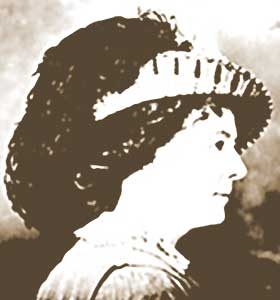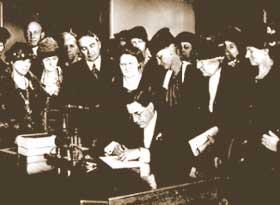
Special Collection
University of Nevada Reno Library
BIRD WILSON – SEVENTH WOMAN LICENSED TO PRACTICE LAW IN NEVADA
The information below has been compiled from a variety of sources. If the reader has access to information that can be documented and that will correct or add to this woman’s biographical information, please contact the Nevada Women’s History Project.
At A Glance:
Born: May 20, 1865
Died: January 27, 1946
Race/Nationality/Ethnic Background: Caucasian
Primary City and County of Residence and Work:
Goldfield (Esmeralda County), Manhattan (Nye County)
Major Fields of Work: Court reporter, Secretary, Stock broker, Mine owner
Other Role Identities: Lobbyist, Women’s Rights Advocate, Suffragist, Woman’s club leader
Bird May Wilson was born in Sandoval, Marion County, Illinois on May 20 th , 1865. Her father was Hazen Wilson, a direct descendant of Revolutionary war soldiers, Captain Nathanial Wilson and Jeremiah Wilson of Massachusetts, and her mother was Susan Dean. In 1860 Hazen Wilson, then 35, was still living on the family farm with his wife Susan, who was 25. The household was headed by his mother Ada Wilson.
Bird Wilson studied court reporting in Chicago which reportedly had more women lawyers than any other city in the world before embarking for San Francisco where she became private secretary to Judge William W. Morrow. Judge Morrow was chairman of the Republican State central committee of California, one of the early chairmen of the San Francisco Bar Association and a Republican Congressman for Northern California for three terms. He then became a United States District Judge for the northern district of California and then served as a Circuit Judge of the ninth judicial circuit from 1897 to 1922.
She attended Hastings Law School while she was working for Judge Morrow and graduated with “high honors”. The Chicago Legal News on June 6, 1903 picked up an article from the May 19, 1903, San Francisco Chronicle and reported that Judge Morrow had moved the Ninth Circuit Court of Appeals to admit her to practice before it, and that she was the first woman on the Pacific Coast to win that distinguished honor. She had previously been admitted to practice before the United States District Court on the motion of United States Attorney Marshall B. Woodworth.
In an interview, Bird Wilson stated that she wanted to actively practice her profession, but that she would continue to work for Judge Morrow for a time. She was also interested in educating women as to their rights under the law. She stated that she had previously written about legal topics and wanted to compile a volume about rights that would give women and girls some elementary knowledge of the subject. She is quoted as saying: “There is a lamentable lack of knowledge among women as to their status and rights under the law, and I hope I may be enabled in some way to make this less”. Most early women lawyers were mentored by male relatives or employers who encouraged them to pursue careers as attorneys just as Judge Morrow seems to have done for Bird Wilson.
She moved to Nevada after the San Francisco Earthquake and was licensed to practice on June 28, 1906, just the seventh woman to be admitted to the profession in Nevada. Bird Wilson was 41 years old when she began practice in Manhattan where she did general civil law, mining and contract law. Less than 6 months after she moved there an article in the Tonopah Bonanza of September 18, 1906 was describing her in glowing terms:
“Miss B.M. Wilson, the prominent lady broker and attorney of Manhattan passed through this city Friday, en route for a two weeks trip to San Francisco. She reports everything booming in Manhattan and predicts a still greater increase in the activity there. Miss Wilson is heavily interested in the Happy Hooligan and states that the giving of a contract for the sinking of a shaft on the ledge running through that claim has been attended with the happiest results, ore of a very high grade having been taken out, and there being every sign of permanence.”

Nevada Historical Society
In Goldfield she became a charter member of the Montezuma chapter of the Daughter’s of the American Revolution. She became more interested in suffrage and the plight of women. She was a member of the Goldfield Women’s Club when it joined the Federation of Women’s Clubs in 1910. She worked toward the establishment of a public library and a watering trough for thirsty dogs. She also supported a congressional bill to outlaw the slaughter of birds for hat plumage and opposed a bill to license draw poker. She participated in bringing enrichment programs to Goldfield and gave a program on Japanese Art and Decoration as well as a program in which she recited the poems of Edward Markham. She served as vice-president of the State Federation of Women’s Clubs and as their lobbyist at the legislature in Carson City. Bird also became the first woman to serve on the examining board of the Nevada State Bar.
Bird Wilson was interested in the plight of women and children and their rights under the law. In both the 1913 and the 1915 Nevada state legislatures she lobbied for the establishment of industrial schools for delinquent children, for married women to have equal rights with their husbands, for community property and for easier divorce laws. She favored joint guardianship of children and was for anti-gaming legislation, public kindergartens and women’s suffrage and wrote to persuade Governor Oddie to ask him to favor them too.
During the suffrage campaign of 1913-14, she was vice president of the Equal Franchise Society and in charge of organizing suffrage workers in the south. She campaigned in Goldfield, Pioche, Panaca and Las Vegas as well as other towns. She also became friends with suffragist Sara Bard Field who came to Tonopah on the advice of Clarence Darrow to try and obtain a divorce. Darrow believed that Nye County Judge Averill was a liberal on divorce matters. Sara hired Bird as her attorney for what would prove to be a particularly nasty divorce. Sara lived in Tonopah with her daughter Catherine to establish the necessary one year residency, and the two women became good friends. Sara’s husband was a Baptist minister named Albert Ehrgott who opposed the divorce even though his wife was in love with Portland attorney and poet, Charles Erskine Wood. Sara became impatient with Bird as the matter dragged on and it was finally left to an attorney in Reno named Hoyt to settle the matter although the divorce cost Sara the custody of her children.
When she wrote the suffrage campaign pamphlet entitled “Women Under Nevada Laws”, Bird Wilson was finally able to accomplish the dream of educating women about the law that she had expressed when she graduated from Hastings Law School. The Equal Franchise Society distributed 20, 000 copies throughout the state during the campaign of 1913-1914. This treatise explained to both men and women that single working women were better off than married ones because a woman’s husband had to consent for a woman to have control over her earnings or her children. Women had no representation in government although they were expected to pay taxes. During this period she worked tirelessly for women’s rights with Anne Martin and along with other nationally known suffragists spoke at the Women Voter’s Convention in San Francisco in 1915.
Bird Wilson continued to be active in women’s clubs throughout the state during the next few years. In 1915 and 1916 she was the honored guest and speaker at the Women’s Civic League in Reno and was on the organization’s state board. In 1916 she also delivered a speech entitled “Do We Over-penalize?” at the annual Federation of Women’s Clubs session in Goldfield. In 1915 the Nevada State Journal reported that she and partner Judge Peter Somers had successfully drilled a well and had water on their Indian Springs property.
Although she returned to live in California sometime in 1917, she remained interested in Nevada politics and regretted that the illness of her mother prevented her from being more active in Anne Martin’s Senate campaign. In 1930 she was living with a sister named Ada Knickerbocke in Oakland and listed her occupation as Court Reporter, an occupation frequently resorted to by female attorneys when they needed money. She was still active in women’s organizations and was on the state board of Business and Professional Women’s Club.
Bird Wilson died in Alameda County, California on January 27, 1946 at the age of 80.
Biography Researched and Written by Kathleen F. Noneman, Esq.
Published Works:
- Wilson, B.M., Women Under Nevada Laws, 1912-1913.
Sources of Information:
- Earl, Phillip I. Bird M. Wilson , Nevada Historical Society.
- Ford, Jean, “Bird Wilson, “Dramatic Script “ The Saga of Nevada Women’s Suffrage.”
- Howard, Ann Bail. The Long Campaign: A Biography of Anne Martin. Reno. University of Nevada Press, 1985.
- Rocha, Guy, Stepping Up To The Bar: Female Attorneys in Nevada. Nevada Library and Archives Myth 72. Accessed 2/12/2005.
- http://dmla.clan.lib.nv.us/docs/nsla/archives/myth/myth72.htm. Originally published in Sierra Sage, Carson City, Carson Valley, NV January 2002.
- Erickson, Mary, Women Lawyers’ Male Connectedness , Stanford University, 1988.
- http: www.law.stanford.edu/library/wlhpb/profiles/WilsonBird.htm. Accessed 2/12/05.
- “Girl Lawyer in Federal Courts”, Chicago Legal News , June 6, 1903, p.349, col.4.
- “Young Truckee Woman Wins a High Honor”, Nevada State Journal , June 10, 1905.
- “A Lady Lawyer at Manhattan”, Tonopah Bonanza, May 19, 1906.
- “Lady Broker in Town”, Tonopah Bonanza, August 18, 1906.
- “A Woman Lawyer Wins Her Case” Tonopah Bonanza , October 15, 1907.
- “Recognition for Nevada”, Reno Evening Gazette , December 23, 1912.
- “World Famous Suffragists Aid in Fight”, Nevada State Journal , February 2, 1913.
- “In the Realm of Society”, Nevada State Journal, November 2, 1913.
- “Convention is Ended Today”, Reno Evening Gazette , February 25, 1914.
- “Miss Martin to Work in East”, Nevada State Journal , June 19, 1915.
- “Pumping Irrigation a Success in South”, Nevada State Journal, June 23, 1915.
- “Nevada Federation of Women’s Clubs Ready for Big Meeting”, Reno Evening Gazette, October 21, 1916.
- “Official Federated Club Notes”, Nevada State Journal”, November 12, 1916.
- “Hayward Social Activities”, The Hayward Semi-Weekly Review, May 6, 1930.
- “Morrow, William W.,” Biographical Directory of the United States Congress, accessed on 3/16/04 from http://bioguide.congress.gov/scripts/biodisplay.pl?index=M001006.
- Application for Membership to The National Society of the Daughters of the American Revolution. Washington, D.C. completed by Bird May Wilson, on May 31, 1910 in Goldfield, Nevada.
- Goldfield Women’s Club Collection, MS 10, Minute Book, UNLV Special Collections, Las Vegas, Nevada.
- Charles Erskine Wood Papers, Henry E. Huntington Library and Art Gallery, San Marino, California.
- Anne Martin Collection, Bancroft Library, University of California, Berkeley, California.
- United States Federal Censuses for 1860 and 1930.
- California Death Index 1930-1947. “Bird M. Wilson.”
